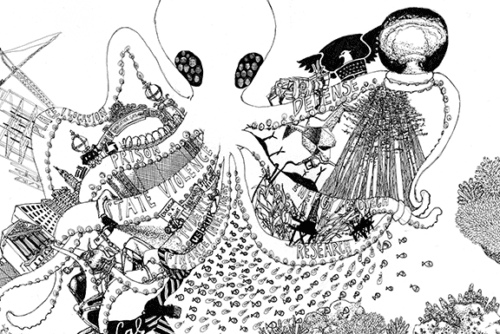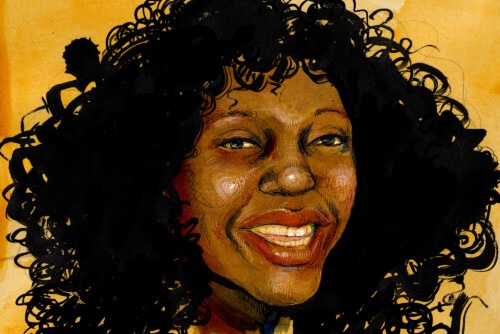Reconfiguring Community Engagement in Pedagogy and Politics
In this essay, we sought to situate those discourses and practices found at the intersections of activism and the academy as complexly entangled in the collusion of state and capital powers, as nonprofits and nongovernmental organizations are now entrenched in the landscape of how we act politically. We do not argue for some other discourse or practice that might be “purer,” instead, we hope to understand what it means to be scholars and activists under these inescapable conditions. As Inderpal Grewal observes, “[I]t would be problematic to simply see these subjects of feminist NGOs as pawns of the state, since they both protested the state’s policies and pointed out its inadequacies; however, they could also not be assumed to have escaped interpellation by the state and nation.” 1 In this spirit, this essay instead suggests that we can pursue programs of study that theorize, mark, challenge, and displace these institutions, especially as the horizon of the politically possible, and that we can understand our own productivity as we supply undergraduates with the critical skills to understand the constraints and consequences of their engagement and to think beyond the historical juncture of the current moment.
We believe that the community-engagement internship must include considerations of the production of knowledge as well as the political within our field formations. To do so, we must complicate the liberal and neoliberal powers that underwrite our conceptions of democracy, community, citizenship, and engagement. We need to critically examine how the community-engagement internship may incorporate the student into administrative bureaucracy, gendered or ethnic service provision, and neoliberal self-narration. We must therefore engage questions such as: What modes of political redress are embedded in these programs and institutions, and which modes are rendered unimaginable (or impossible)? What concepts of justice, whether inured in concepts of rights or entrepreneurial selfhood, or in commitments to redistribution and structural transformation, are articulated and practiced there? What concepts and practices either impede or aid us in thinking through the dual tempo of the long haul of institutionalization and the now of social change?
We do not argue here against the community-engagement internship altogether; indeed, the internship might usefully be brought to bear upon analyses of our neoliberal moment. To do so, the internship might be paired with theoretical and historical works in a classroom setting that encourages collaborative dialogue about the scope of our activism and advocacy. To name just a few more contributions to this field of inquiry, Kristen Bumiller astutely documents the cooptation of the domestic violence movement by the neoliberal state in the realms of medicine and criminal justice, while Lamia Karim offers a brilliant ethnography of the Grameen Bank in Bangladesh, closely examining “microcredit and its discontents.” 2 Deborah Mindry usefully questions the “politics of virtue” through which women’s NGOs must “sell” themselves or their targeted populations to foundations and other funds as deserving help, and Soo Ah Kwon troubles the project of youth-of-color “empowerment” as a supplement to their simultaneous criminalization, in which the former enacts modes of governmentality that aim to transform potential at-risk youth to avoid actualizing the latter, and to instead become good, democratic subjects. 3 We might also wonder if the narration of self-sovereignty in both the development model and the revolutionary movement is something that is worth troubling further, as Josefina Saldana-Portillo does. 4
We further suggest that existing internship programs can easily be reimagined to address the changed landscape of political action. Some courses in ethnic studies programs have sought to consider more deeply the concepts of community service and labor toward this end, such as in Glenn Omatsu’s courses at the University of California, Los Angeles. His courses, “Asian American Social Movements: Mobilizing for Peace and Justice” and “Asian American Social Movements: Pacific American Labor Studies,” examine “the key role that Asian Pacific American students can play in supporting labor struggles of low-income immigrants,” with particular attention to “class polarization, which increasingly is becoming a major feature of Asian Pacific American communities.” 5 Here, Omatsu signals the complexities of community under capital that produce multiple scales of alienation. Omatsu’s courses, in which students actively participated in immigrant workers’ campaigns to unionize a Little Tokyo hotel or support Los Angeles garment workers, emphasize explicit accountability for often uneven relations of encounter and exchange. 6 He notes in his syllabus, “[In providing] activist training for students to work with community groups, community-based labor groups, unions, and immigrant workers[,] this training will address the class privileges of students in elite institutions such as UCLA and the ways that they can use campus resources to support the struggles for justice by immigrant workers.” 7 In this way, Omatsu’s coursework generates both classroom and on-site community spaces as scenes for articulating active and constantly changing collectivities. Using an anticolonial and community-based pedagogical approach, Omatsu takes the legacy of political activism and community service in ethnic studies courses seriously. Minoo Moallem’s engaged scholarship courses at the University of California, Berkeley, pose another example of how to make such courses intellectually rich and politically rigorous. With a three-part series of engaged scholarship programs, the Gender and Women’s Studies Department highlights the limits and possibilities of this labor:
Central to the courses are difficult questions concerning the ethics of help, the political economy of private volunteerism, and the limits and possibilities of different forms of social engagement. The courses interrupt the logic of service learning models predicated on hierarchical assumptions of who constitutes a helper and who constitutes the helped. This methodology of engagement challenges students to consider relationships of power produced and replicated in some popular models of volunteerism. 8
Expanding on earlier service-learning courses in this way, Moallem confronts the critiques raised over the years about the relationship of gender and women’s studies programs to community engagement, or as she puts it “community-engaged scholarship,” with particular attention to the politics of help and the unevenness of capital. As is made clear in the course description, students are required to critically examine their own engagement in nonprofits or NGOs and the organizations’ engagement in, rather than escape from, structures of power. In another engaged scholarship course, “Women, Poverty and Globalization,” the syllabus notes: “Students will dissect the intent of the community organization, contextually locate the organization in the current global/political moment, and understand how its operational prerogatives impact its work.” Hence, students do not enter into an internship with an organization acting as a surrogate for community, but rather conduct quasi-ethnographic studies of institutions embedded in often unjust structures of governance and capital.
Moreover, though the syllabus for Moallem’s course, “Engaged Scholarship in Women and Gender Studies,” does follow some of the conventions of other community-engagement internships (including journal writing), these activities are undertaken in a course (as opposed to an independent study) that meets regularly for students to discuss readings organized in rubrics designed to prompt just the sort of inquiries we have pursued in this essay—the politics of location, interrogating community, the limits of helping—as well as readings that push against the presumption of a divide between theory and practice, abstraction and real life. Whereas the internship as an independent study is a solitary pursuit, semester-long courses such as Omatsu’s and Moallem’s situate concerns such as the histories of help and the supplemental relations of community and capital as important to our intellectual inquiry, especially as the politics of knowledge informs our practices of social engagement, and our sense of what is possible under the sign of the political. To actualize this, we recognize, is not an easy task. In the context of research universities, as Moallem notes, such courses are considered to be service classes—either not taken seriously as a way of generating significant scholarship or controlled by the administration.
The question we must return to again and again is how we might best address the challenges of the current moment in the corporatizing university and beyond as the institutionalization of social change through the nonprofit and NGO structures the political in neoliberal times. Our purpose in focusing on the community-engagement internship in ethnic studies or gender and women’s studies is not to argue either for or against it as such, but rather to interrogate how the internship partakes of larger shifts in shaping and limiting the promise and the practice of the political. For us, community engagement must assist students in understanding that activism and democracy do not simply rest on troubling substitutions of nonprofit for community and help for justice, as well as assisting students in articulating all our complicities with hegemonic governmental powers, corporate restructuring, and practices of entrepreneurial self-making. Refusing to give ground is particularly important when programs like ethnic studies and gender and women’s studies are under threat, a threat rationalized not only in economic terms, but also through rhetorics that delegitimatize our disciplines as valid bodies of knowledge or inquiry. The introduction of House Bill 2281 in Arizona to dismantle ethnic studies curricula—just one example of the threat of dissolution hanging over ethnic studies and gender and women’s studies—means that the work that we do and that we ask of our students is ever more urgent and pressing. In her appraisal of HB 2281 and the surrounding debates about community, empowerment, and civic citizenship, Lisa Marie Cacho eloquently dismantles the claims laid on ethnic studies scholarship by proponents of the bill, even as she affirms the necessary—because dangerous—nature of the political stakes in our teaching and research. Cacho observes that modes of evaluation, such as “academic integrity,” “practical knowledge,” and otherwise rationalized categories are “designed to manage and minimize threats to the status quo, which makes [our work] a less useful instrument for other purposes, like demolishing the racist, patriarchical, and heterosexist foundations of US society or erecting something more honest, compassionate, and accountable in its place.” 9 Indeed, it is in this spirit that we believe that engagement with these purposes is absolutely necessary as both a theoretical query and a real project, and that gender and women’s studies and ethnic studies scholarship continue to be critical to this endeavor.
- Grewal 2005: 143.[↑]
- Kristin Bumiller, An Abusive State: How Neoliberalism Appropriated the Feminist Movement Against Sexual Violence (Durham: Duke UP, 2008); Lamia Karim, Microfinance and Its Discontents: Women in Debt in Bangladesh (Minneapolis: U of Minnesota P, 2011).[↑]
- Debra Mindry, “Nongovernmental Organizations, ‘Grassroots,’ and the Politics of Virtue,” Signs 26:4 (2001): 1187-1211; Soo Ah Kwon, Uncivil Youth: Race, Activism, and Affirmative Governmentality (Durham: Duke UP, 2013).[↑]
- Maria Josefina Saldana-Portillo, The Revolutionary Imagination in the Americas and the Age of Development (Durham: Duke UP, 2003).[↑]
- Glenn Omatsu, course syllabus, “Asian American Social Movements: Mobilizing for Peace and Justice.” Available at http://www.sscnet.ucla.edu/aasc/classweb/winter03/aas116/syllabus.html, accessed 4 Dec. 2006.[↑]
- Glenn Omatsu, “Teaching for Social Change: Learning How to Afflict the Comfortable and Comfort the Afflicted,” Loyola of Los Angeles Law Review 32 (1999): 791-97; Glenn Omatsu, “Mobilizing Students to Respond to Community Needs—Organizing a Class around a Community Project,” Teaching about Asian Pacific Americans: Effective Activities, Strategies, and Assignments for Classrooms and Workshops, eds. Edith Wen-Chu Chen and Glenn Omatsu, (Lanham: Rowman & Littlefield, 2006) 204-215; Glenn Omatsu, “Linking ‘Book Knowledge’ to ‘Lived Experience’: Incorporating Political Tours of Our Communities into Classrooms,” Activist Scholarship: Antiracism, Feminism, and Social Change, eds. Julia Sudbury and Margo Okazawa-Rey, (Boulder: Paradigm, 2009) 167-185.[↑]
- Omatsu, course syllabus.[↑]
- The three courses in this series are “Engaged Scholarship in Women and Gender,” “Women, Poverty, and Globalization,” and “Queer Theories/Activist Practices.” Our gratitude to Minoo Moallem for sharing her syllabi for the first two of these courses.[↑]
- Cacho 2010: 34.[↑]




